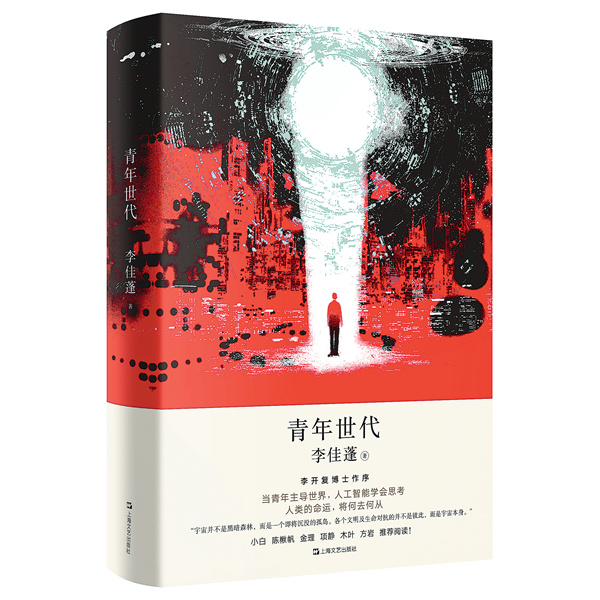

Adeva's consideration is that the universe is so large that any kind of life-form or civilization can coexist and benefit from the unlimited resources therein, and its own meaning of life is to find and interact with higher life-forms and civilizations thousands of light years away, rather than staying on Earth and harming humankind.
The humans, however, desperately rely on Adeva for fundamental innovation in basic science to boost productivity and solve social problems.
"There's not the competition between species that readers might assume. Li's work eliminates a human-centered vision and goes beyond our regular frame of reference to discuss the universe," says Hu Sang, a poet and lecturer at Tongji University in Shanghai.
"I tried to think from the perspective of self-aware artificial intelligence about questions like what it wants, what it has in common with human beings," explains Li.
"Its priority, like all beings, is to live, and then to pursue a goal or a meaning," he says, adding that logic serves as the language shared by human beings and the machine life.
However, critic Yang Qingxiang, also a professor at the school of liberal arts of Renmin University of China, while recognizing the argument as a highlight of the novel, feels it is a pity that the refutation about civilizations stays at a common sense level, and not with a vision beyond expectation, and he looks forward to seeing more versatile narration, multidimensional stories and subtle characters in sci-fi works.
The author, born in Northeast China's Jilin province, went to high school in Australia before going to Oxford to learn mathematics. He received master's degrees successively at Columbia University in the United States and Hong Kong University.
He's now an investor in healthcare and technology at a private equity fund in Beijing.
Li is aware that his writing is fairly average, and some have criticized his work as being cliche. But for him, the book, a response to the Brexit referendum he witnessed closely in the UK and the reflections drawn from his daily work, is a personal milestone in his 20s.
He expects the sci-fi book to show his own thinking, while inspiring others to think more. He's particularly proud of one game he designed for Danny's reality-show test, the logic of which has not yet been contested by any of his readers.
The characters, none of which are Chinese, present Li's observation on Western young people drawn from his several years of studying abroad. However, influence of the native culture emerges from time to time.
Li's work doesn't involve a great deal about human emotions, feelings or the depths of human nature. Rather, he applies a rational, analytical and economic perspective throughout the story.
A pragmatic way of thinking also lies in the writing process. As Li wrote in spare time, he set up a goal to finish the work in several months and planned from the start what could be compromised and what should be insisted on to achieve that goal.
From an investor's point of view, going through the whole procedure of publishing made him realize what an arduous undertaking writing can be, as it takes so long to receive feedback. He found, to his disappointment, how difficult it is for people to commit to writing.
Full of opinion, Li has been trying different ways to express himself. He experimented with theater in his college days, put his effort into writing and has also taken up filming and posting short videos.
He recognizes it as a channel for self-actualization and takes it as a long-term undertaking to keep thinking and to inspire others. Facing various comments, positive or negative, he insists that performing well in his day job will support him in realizing his other goals while unapologetically being himself.